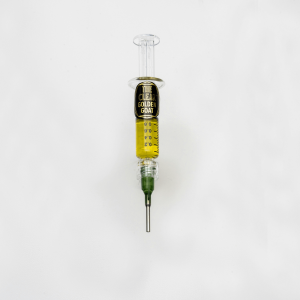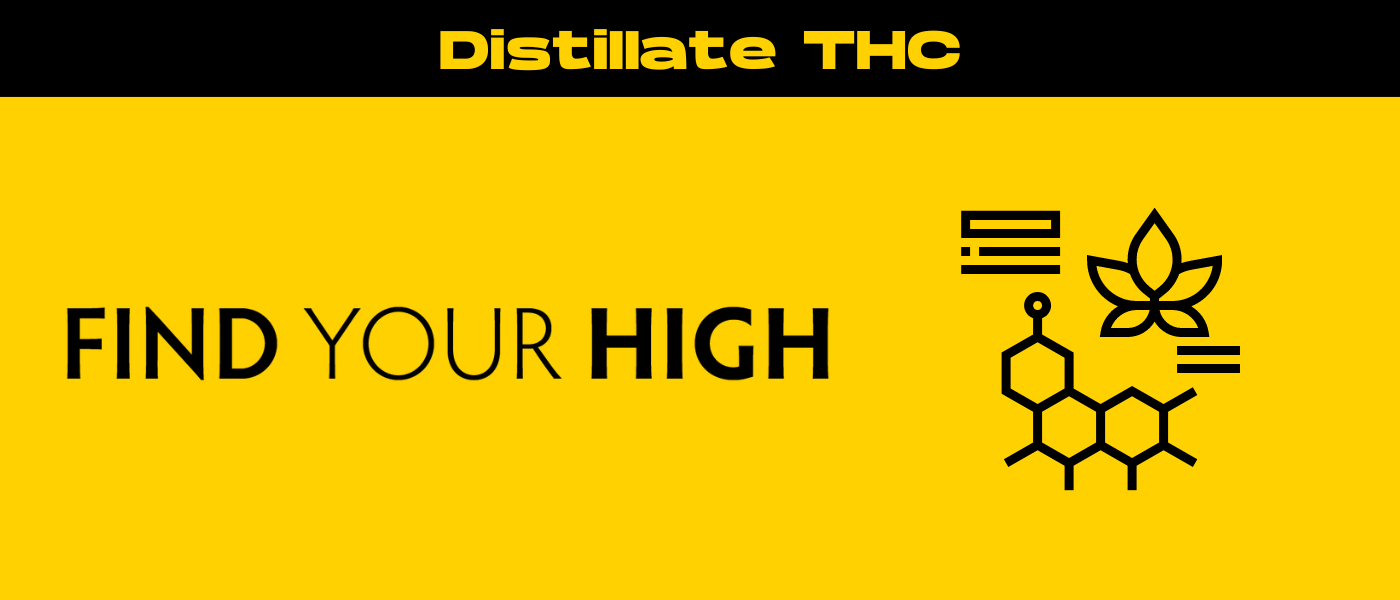THC, or tetrahydrocannabinol, is the primary psychoactive component responsible for a range of effects on the human body and mind. These effects span from euphoria and relaxation to, in some cases, anxiety and paranoia.
Enter the world of THC distillates—a highly potent form of THC that has been refined to eliminate impurities and extra plant matter. This process results in a pure, potent product that offers a cleaner, more controlled high.
This blog will guide you through everything you need to know about THC distillates, from their manufacturing process to their benefits and how to use them safely. We’ll also dive into the differences between distillates and other forms of cannabis concentrates, helping you make informed decisions when filling your Hyperwolf cart.
Let’s begin!
What is Distillate THC?
Distillate THC stands out as one of the most refined forms of cannabis concentrate you can find. Through the distillation process, the desired THC is separated from the raw cannabis plant, getting rid of unwanted compounds like chlorophyll, waxes, and oils.
What you get is a near-pure THC product! Heating the cannabis extract to vaporize the cannabinoids and terpenes, and then condensing them back into a liquid form, results in a product free of impurities or plant matter.
The key characteristic of THC cannabis distillate is its purity. It typically boasts a potency of 80-90% THC, making it one of the most powerful forms of cannabis concentrates. This high concentration means that even a small amount can produce a significant effect.
Additionally, since distillates are odorless and tasteless, they provide versatile usage options – perfect for dabbing, vaping, or infusing into edibles, all without the herbaceous taste of cannabis.

The Distillation Process
The making of THC distillate involves a careful process that transforms cannabis oil into a strong, pure product. Here’s a breakdown step by step:
Step 1: Selection of Raw Material
The process begins with the selection of high-quality cannabis plants. The concentration of THC in the distillate highly depends on the quality of the raw material used. Only the best, most cannabinoid-rich strains are chosen for distillation.
Step 2: Extraction
Next, cannabinoids are extracted from the plant using a solvent. This can be done through various methods, including CO2, ethanol, or hydrocarbon extraction. The goal is to pull out the maximum amount of cannabinoids and terpenes while leaving behind plant material.
Step 3: Winterization
The crude extract then undergoes winterization. This cooling process is crucial for removing fats, waxes, and lipids. It involves mixing the extract with ethanol and then freezing it, which helps separate out these impurities.
Step 4: Decarboxylation
Before distillation, the extract must be decarboxylated. This means it’s gently heated to activate the THC. Raw cannabis contains THCa, which is non-psychoactive; heating it converts THCa to THC, amplifying the extract’s potency.
Step 5: Distillation
Finally, the decarboxylated extract is ready for distillation. Using precise temperatures, THC is vaporized and then condensed into a liquid form. This phase purifies the substance, eliminating any remaining impurities or unwanted compounds, resulting in a potent, nearly pure THC product.
Differences between Distillation of THC and Traditional Methods
The key difference in distilling THC compared to traditional concentrate methods is how pure and strong the end product is.
When you go the old-school route like making hash or pressing rosin, you keep more of the natural terpenes and compounds from the cannabis plant. These methods give you the full spectrum of the plant’s chemicals, which means a wider range of effects thanks to the entourage effect, even though they usually come with lower THC levels.
On the flip side, THC distillation is all about isolating and purifying THC for a stronger kick. The trade-off? It loses most terpenes and other extra plant material, leaving you with a product that’s scentless and tasteless.
This potent focus lets users enjoy a cleaner, more intense high using less, and it gives you options on how to use THC distillate. However, you might miss out on the full range of effects you get from consuming all the plant’s compounds together.
Benefits of Distillate THC
The appeal of purchasing THC distillate isn’t just about its strong potency, but also its versatility and purity.
Purity and Potency
Firstly, the exceptional purity of THC distillate ensures that users are getting a product free from additives, pesticides, or any residual solvents used in the extraction process. This level of purity significantly reduces the risk of contaminants that could potentially have adverse health effects.
Additionally, the high concentration of THC, often reaching up to 90%, allows for a powerful effect even in small doses. This potency is particularly beneficial for medicinal users who require a consistent and strong dose to manage chronic symptoms.
Versatility in Usage
Another noteworthy advantage of THC distillate is its versatility. The odorless and tasteless nature of the distillate makes it an ideal additive to a variety of products, from edibles and topicals to refined cannabis oil.
Whether it’s enhancing the potency of homemade edibles without altering their flavor or providing a clean vaping experience, pure THC distillate offers a convenient and adaptable solution.
How Distillate THC is Used
Distillate THC’s versatility means it can be consumed in multiple ways, catering to the preferences of all users. Some of the most common methods include:
- Vaping and Dabbing: Because of its purity and potency, distillate THC is perfect for vape cartridges and dabbing. It provides a clean, smooth experience that highlights the strength of THC without any plant material or impurities affecting the taste or smell.
- Infusing into Edibles: THC distillate can easily be incorporated into edibles without impacting the flavor profile. This makes it an excellent choice for users looking for precise dosage or for those wanting to enjoy cannabis-infused foods without the herbal taste.
- Medical Products: Its high potency and purity make distillate THC a popular option in the formulation of medical cannabis products. It allows for accurate dosing, essential for patients who rely on cannabis for relief from chronic conditions and pain management.
Edibles and Distillate THC
Blending THC distillate with edibles is a perfect match. Its odorless and tasteless properties allow it to seamlessly combine into any recipe, preserving the original flavor while infusing it with potent effects.
The primary advantage lies in the precise control over dosage. With distillates, knowing the exact THC content facilitates the creation of consistently dosed edibles.
Tips for Dosing and Consumption
Start with a low dose, especially if you are new to cannabis-infused edibles or using a new batch of THC distillate. Given the potency, it’s easier to increase the dose gradually than manage the discomfort of overconsumption. Always wait for at least one to two hours to fully experience the effects before considering additional intake.
Vaping with Distillate THC
Vaping THC distillate stands out as a preferred method for many due to its efficiency and cleanliness. The high purity equates to less residue in vaporizers and a smoother vaping experience. Plus, the absence of plant matter or additives emphasizes the potency, making for an effective and enjoyable use.
Vaping distillate THC offers immediate effects compared to edibles, allowing users to gauge their intake more effectively. It also avoids the potential respiratory risks associated with smoking plant material, presenting a cleaner alternative both taste-wise and health-wise.

Comparing Distillate THC with Other Extracts
When diving into cannabis extracts, knowing the differences between distillate THC, full-spectrum, and isolate products is key for picking what suits you best.
Distillate THC is famous for its purity and strength, packing a punch of THC without the plant’s natural terpenes or other compounds. It’s great for those after strong effects or for precise dosing in medical use.
Full-spectrum extracts, on the other hand, offer a mix of cannabinoids, terpenes, and other goodies from the cannabis plant. Many stoners like full-spectrum products for the ‘entourage effect,’ where all these components team up to boost their therapeutic perks.
Isolates focus on a single pure cannabinoid, usually CBD, giving targeted benefits without THC’s high. If you’re into a specific cannabinoid’s perks or are sensitive to THC, isolates might be your go-to.
The choice between distillate THC, full-spectrum, and isolate comes down to what effects you’re after – whether it’s strong THC, a mix of plant compounds, or the pure benefits of one cannabinoid.
Summary
In conclusion, THC distillate stands out in the cannabis market for its unmatched purity, potency, and versatility. Its ability to provide powerful effects in small doses, alongside its adaptability for use in edibles, vaping, and medical products, underscores its appeal to both recreational and medicinal users.
However, it’s essential to approach consumption with caution. Starting with a low dose and gradually adjusting is key to a positive experience, especially given the concentrate’s strength.
Additionally, continual education about cannabis, its effects, and the latest innovations in cannabis products is vital for responsible use. By staying informed and mindful, users can fully enjoy the benefits of THC distillate while minimizing risks.

Frequently Asked Questions
1. Is THC distillate stronger?
Yes, THC distillate is among the strongest forms of cannabis extracts available on the market. Its high level of potency is due to the distillation process that removes impurities and unwanted compounds, leaving a pure, concentrated form of THC. This process can result in THC concentrations of up to 90%, significantly stronger than traditional cannabis flower or other extracts.
2. Why is distillate cheap?
Despite its high potency, THC distillate can be relatively less expensive compared to other extracts. This is mainly because the distillation process allows manufacturers to use lower-quality cannabis, including parts of the plant that would otherwise be discarded. The efficiency of extracting THC in large quantities also contributes to a lower price point, making distillate a cost-effective option for both consumers and producers.
3. Is distillate 99% THC?
While THC distillate can achieve purity levels close to 99%, most commercial THC distillate syringes typically range between 80-90% THC. The exact purity level can vary depending on the distillation process and the quality of the cannabis used. Achieving 99% THC is technically feasible but requires additional refinement processes that may not be practical or cost-effective for all producers.
4. What is the potency of THC distillate?
The potency of THC distillate can vary, but it is generally considered one of the most potent forms of cannabis available. It commonly features THC concentrations ranging from 80-90%, making it significantly more potent than other forms of cannabis extracts. This high level of potency is a result of the distillation process, which effectively isolates and concentrates THC, eliminating most other plant materials and impurities.

 Rewards
Rewards




